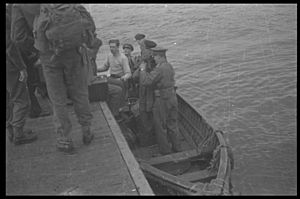Richard Hilton (British Army officer) facts for kids
Quick facts for kids
Richard Hilton
|
|
|---|---|
| Birth name | Richard Hilton |
| Born | January 18, 1894 Rawalpindi, British India, |
| Died | July 26, 1978 (aged 84) Buckingham Hotel, Buxton, Derbyshire, U.K. |
| Spouse(s) | Phyllis Martha Woodin |
Major-General Richard Hilton was a brave British soldier, pilot, and author. He was born in 1894 and lived until 1978. He fought in both the First World War and the Second World War.
He also wrote books using the name Zakhmi Dil. This name comes from a Pathan marching song and means "Wounded Heart."
Contents
Early Life and Education
Richard Hilton was born in Rawalpindi, which was part of British India at the time. His father, John Edward Hilton, was a civil engineer.
When Richard was just three years old, he moved to England. He went to live with his uncle in Kent. One of his first memories was the big celebration for Queen Victoria's Diamond Jubilee.
He studied at Malvern College from 1907 to 1911. After that, he went to the Royal Military Academy, Woolwich. In December 1913, he officially joined the Royal Garrison Artillery as an officer.
A Brave Soldier and Pilot
Richard Hilton served actively in the First World War. During this time, he also trained to become a pilot.
In June 1916, he was a Lieutenant in the Royal Artillery. He was awarded the Military Cross for his bravery. Later, on September 21, 1918, he received the Distinguished Flying Cross. This award recognized him as a "most courageous and determined officer."
Before that, on August 8, 1918, he showed great skill. He landed his aircraft safely even after it was badly damaged. This happened after five enemy planes attacked him.
World War II and Beyond
By 1938, Hilton was a very important instructor. He was the Chief Instructor at the Royal School of Artillery. From 1941 to 1944, he was the commanding officer of the Royal Artillery's 15th Infantry Division.
In January 1943, he was promoted from Lieutenant Colonel to Colonel. He also held the temporary rank of Brigadier.
On May 8, 1945, which was VE Day (Victory in Europe Day), Hilton led a special group. He and seventeen other Allied Military Commission Officers traveled by seaplane to Norway. Their important mission was to accept the surrender of the German forces in Norway. These forces were led by General Böhme. Hilton successfully accepted the surrender. For this, he was later given the Norwegian Order of St. Olav. He stayed in Oslo as a Brigadier for the Allied Forces in Norway.
Richard Hilton was also very good with languages. He could speak eleven different languages, including Russian. From 1946 to 1947, he worked as a deputy head. He was part of the British Military Mission in Germany. His office was at the headquarters of Marshal Sokolovsky in Potsdam.
In August 1947, Hilton was given the local rank of Major-General. His last job in the army was from 1947 to 1948. He worked as a military attaché at the British embassy in the Soviet Union. He later wrote a book about his experiences there.
In May 1948, he was promoted to Brigadier. He still held the local rank of Major-General. On October 11, 1948, he retired from the army.
Life After the Army
After retiring from the military, Richard Hilton became a journalist. He also became a leading member of a group called the League of Empire Loyalists. He left this group by 1959.
In 1958, Hilton published a book called The Thirteenth Power. In this book, he wrote about his ideas on global influence. He believed that certain powerful financial groups could control world governments. A reviewer noted that Hilton often judged things based on what he thought was best for British interests.
In 1962, Hilton started a group called the True Tories. Many of its members were former soldiers. For the 1964 United Kingdom general election, this group became the Patriotic Party. After the election, he restarted the True Tories. In 1966, he was the president of the National Youth League.
In his 1968 book, Imperial Obituary, Hilton looked at events since 1945. He believed that Britain's power had declined due to certain influences, including some from the London School of Economics.
Family Life
In 1917, Richard Hilton married Phyllis Martha Woodin. She was the daughter of Reverend Stanley Hassall Woodin. They had two sons together.
One of their sons, Sir Peter Hilton, followed in his father's footsteps. He also joined the Royal Artillery. Later, he became the Lord Lieutenant of Derbyshire.
Richard Hilton passed away on July 26, 1978. He was living at the Buckingham Hotel in Buxton, Derbyshire, at the time. His wife, Phyllis, lived until 1980.
His Books
- Richard Hilton, Military Attaché in Moscow (1949)
- Richard Hilton, Nine Lives: the Autobiography of an Old Soldier (1955)
- Richard Hilton, The Indian Mutiny: A Centenary History (1957)
- Richard Hilton, The North-west Frontier: a true story for boys, illustrated by Klaus Meyer (1957)
- Richard Hilton, The Thirteenth Power: the Middle East and the World Situation (1958)
- Richard Hilton, Imperial Obituary: the Mysterious Death of the British Empire (1968)


